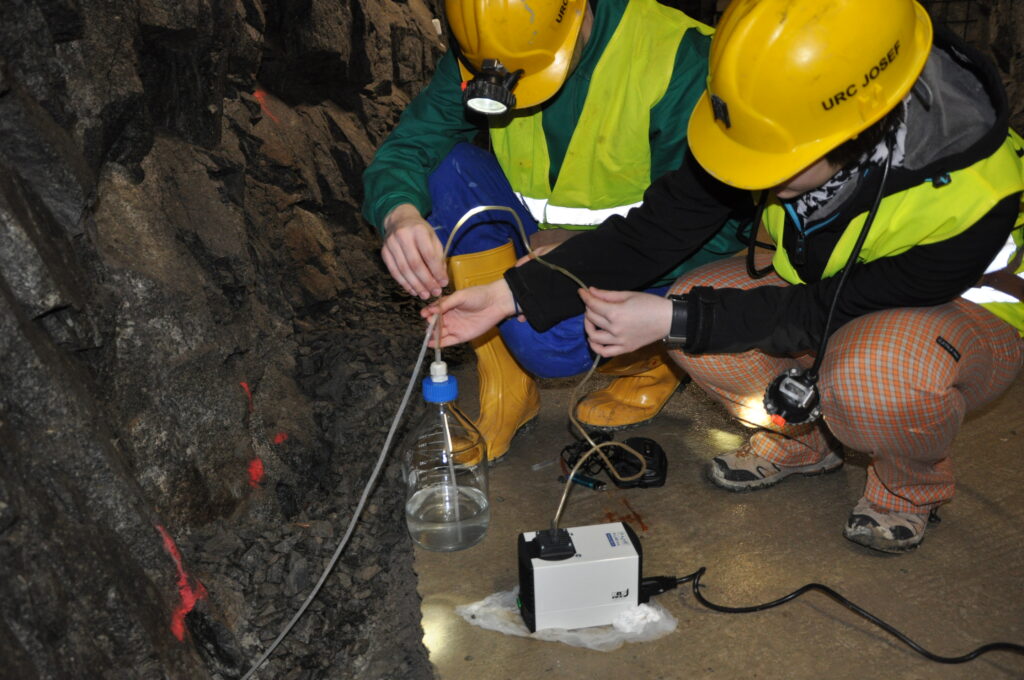Teaching activities
The subjects taught by the CEG concern mainly experimental geotechnics, the teaching of which takes place both in the Prague laboratories of the Faculty of Civil Engineering, CTU and the Josef Underground Laboratory. The topics covered are in all cases related to research and development projects that are either underway or are in the preparation stage. Thus, students have a unique opportunity to participate in experiments under real conditions and to compile their theses on currently important topics.
If you are interested in our various study options or initiating external cooperation with the CEG, please contact us at: radek.vasicek@cvut.cz!
The departments of Specialised Geodesy and Geotechnics also teach courses in the Josef Underground Laboratory. The involvement of other Czech universities at our facility is managed via the so-called MEZILAB (inter-university laboratory) system.
Bachelor and Master’s studies
Doctoral studies
Student grant competition
The current list of subjects taught during this semester can be found on the FSv website
Topics for the conducting of projects and the compilation of bachelor and diploma theses are selected on an individual basis with the agreement of the students involved and according to the projects currently underway at the CEG.

MEZILAB a MEZILAB II
The centralised MEZILAB development project provided the opportunity for cooperation between four universities in the training of experts, e.g. in the field of the construction of the Czech deep geological repository for spent nuclear fuel and high-level radioactive waste (DGR), the operation of underground gas storage facilities, etc. The laboratory is used by the participating universities for the conducting of short- and medium-term teaching activities. The Faculty of Civil Engineering and the Faculty of Nuclear and Physical Engineering of the Czech Technical University, Prague, the University of Chemistry and Technology, Prague, the Masaryk University, Brno and the Liberec University of Technology are all involved in this joint university laboratory project. The subjects taught depend on the topics covered by the respective universities.
MEZILAB
Project for the construction of an inter-university underground laboratory in the Josef gallery for the in-situ teaching of transport processes in a real rock environment.
Participants: CTU – FSv (Faculty of Civil Engineering) and FJFI, Prague, MU, Brno, TU, Liberec, VŠCHT, Prague
The university-level study of the construction and operation of underground gas reservoirs, the disposal of spent nuclear fuel in DGRs and the underground storage of CO2 were all of particular importance in the decision to establish the inter-university laboratory in the Josef gallery. The fact that these topics require a multidisciplinary systemic approach was a major factor in terms of the four universities joining forces to construct the MEZILAB. The underground laboratory was established in June 2010. The laboratory is equipped in a similar way to classic university laboratories, i.e. tables with 10 workplaces, sockets for the computer and Wi-Fi networks etc., which ensure an ideal environment for both the regular teaching activities of the four afore-mentioned universities and for students who need to compile their theses under in-situ conditions. Regular teaching commenced at the start of the 2010/11 academic year according to the innovative study plans drawn up by the respective universities and in line with the compilation of student theses. Almost 800 students from the 4 universities have completed courses taught in the MEZILAB/Josef gallery to date.
MEZILAB II
Project for the construction of an inter-university underground laboratory in the Josef gallery for the in-situ teaching of transport processes in a real rock environment.
Participants: CTU – FSv and FJFI, Prague, VŠCHT, Prague
We often have to consider transport processes when addressing geotechnical issues:
- the underground storage of energy resources (gas reservoirs, CO2 underground storage, storage of excess energy in discontinuous rock environments),
- the safe isolation of spent nuclear fuel in DGRs (the study of radionuclide migration)
- and when removing old ecological burdens.
Four teaching stations for the study of different transport media (gases, liquids, suspensions etc.) serve for the practical teaching of transport processes in the in-situ rock environment.
MEZILAB II was constructed in the Josef underground laboratory in a niche in the Mokrsko west area of the complex and houses 4 different experiments focusing on transport processes. The laboratory is equipped with all the facilities required for university-level tuition, i.e. connections to the computer and wifi networks, sockets, desks, etc. Two faculties of the CTU, Prague are involved in the teaching activities (the Faculty of Civil Engineering and the Faculty of Nuclear and Physical engineering) along with the University of Chemistry and Technology, Prague. The laboratory was commissioned in June 2014.
The construction of the in-situ laboratory for research into, and the teaching of, transport processes is supported by the Czech Radioactive Waste Repository Authority (SÚRAO) with respect to the training of experts. SÚRAO had a consultative role in the project.